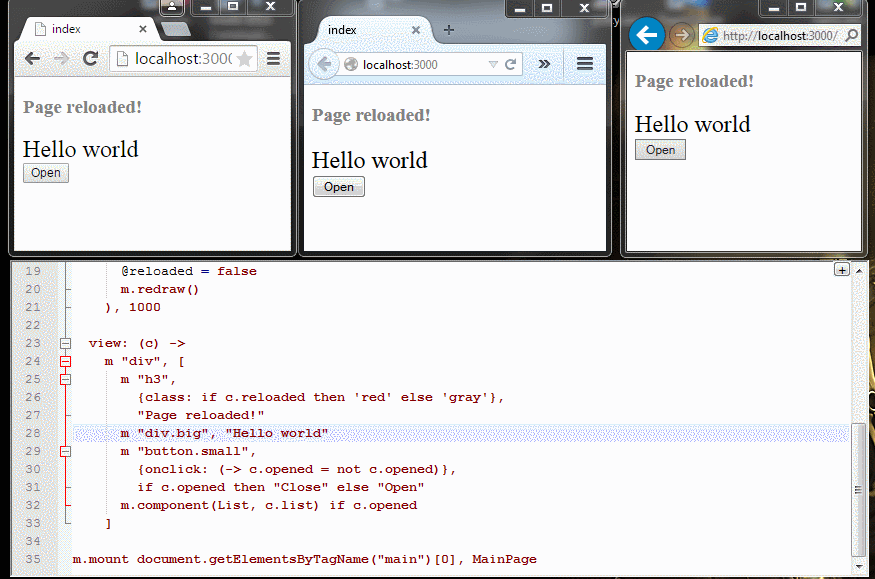This plugin allows to re-arrange js code to move all mithril views into separate js file and reload it softly with LiveReload, so you may make changed in code and see result without page reload in browser.
See here
npm install --save-dev gulp-livereload-mithril
In 99% cases (and for demo above) you also will need:
npm install --save-dev gulp-changed gulp-live-server
And if you use browserify then you'll probably need additional modules:
npm install --save-dev vynil-buffer vynil-source-stream browserify-incremental
Just include it in pipe after all processing of js code but before saving it to destination folder and notifying live reload server.
Always use gulp-changed after this plugin.
var extract = require('gulp-livereload-mithril');
//...
gulp.task('compile', function () {
//-------------------------------------------------// So here we
gulp.src(SRC) // 1) get coffeescripts
.pipe(coffee()) // 2) compile to javascript
.pipe(extract()) // 3) extract mithril views into separate file named `st8less.js`
.pipe(changed(DEST, { // 4) ignore js files which contents not changed
hasChanged: changed.compareSha1Digest //
})) //
.pipe(gulp.dest(DEST)) // 5) copy changed to public
.pipe(server ? server.notify() : gutil.noop());// 6) notify server about changed files only.
});If you don't know how to work with LiveReload please refer to documentation for gulp-live-server plugin and for LiveReload itself.
You do not need to include extracted file manually by default - corresponding <script> will be injected into one of your original js files.
For small projects you may just put extractor after browserify. But if your project is big enough and you see noticeable delay between code change and browser update then you may use the following recipe:
var extract = require('gulp-livereload-mithril');
var source = require('vinyl-source-stream');
var browserifyInc = require('browserify-incremental');
var buffer = require('vinyl-buffer');
var extract = require('gulp-livereload-mithril');
//preparation
b = browserifyInc({ // 1) create browserifier outside any task
entries: ["src/yout_root_script.coffee"],
extensions: ['.coffee'],
});
var m = extract().browserify; // 2) create extractor outside any task, get `browserify` property
b
.transform('coffeeify')
.transform(m.transform()); // 3) provide transform function (will be applied to any changed file)
gulp.task('compile', function () {
b.bundle()
.pipe(source('index.js')) // 4.1) put composed by browserify source to pipe with name 'index.js'
.pipe(buffer()) // 4.2) and convert it to buffer
.pipe(m.inject()) // 5) here put extracted functions' file into pipe
.pipe(changed(DEST, { // 6) ignore js files which contents not changed
hasChanged: changed.compareSha1Digest //
})) //
.pipe(gulp.dest(DEST)) // 7) copy changed to public
.pipe(server ? server.notify() : gutil.noop());// 8) notify server about changed files only.
});If then you use watch to run compile task on any change then browserify-incremental will get only changed files, recompile them and pass through our extractor. Then both browserified index.js and extracted st8less.js will be re-composed with changed functions only, which will take much less time.
Note that both browserify and extractor are initialized outside any task, so they are able to keep state between task calls by watch. If you initialize them inside a task definition then full recompiling will be performed.
extract() functions accepts options object with following properties
dest- path to store the js file with extracted view functions. Note that path is relative to thegulp.destfolder you'll specify. Default is empty (so new file will be placed into the root of dest folder)scriptName- name of the script file. Default isst8less.jsinject- if true then script with extracted functions is injected automatically (viadocument.writein one of the original scripts). If you'd like to include it to page manually set it to false.injectPath- relative path to script for injection. Has meaning ifinjectis true then script with pathsplit- object that declares which functions shall be extracted. Seemithril.extract.jsin sources for example. Shall have 2 properties:append- string to write into extracted filecriteria- function that will be called for each met function and shall return true if it shall be extracted. Accepts 1 object parameter with properties:name- name of function, or name of variable/property name (in case ofvar a = function(){}name will bea)attribute- first string expression in function body, for example infunction view() { "__stateless"; return 5;}the attribute will be__stateless)paramNames- list of function argument names
It returns a function that could be used in a pipe. Also this function has browserify field which contains browserify helper object with 2 functions:
transform- returns transformer forbrowserifyinject- pipe function to gulp, shall be used afterbrowserify.
